|
Whitehall Road
Harbledown
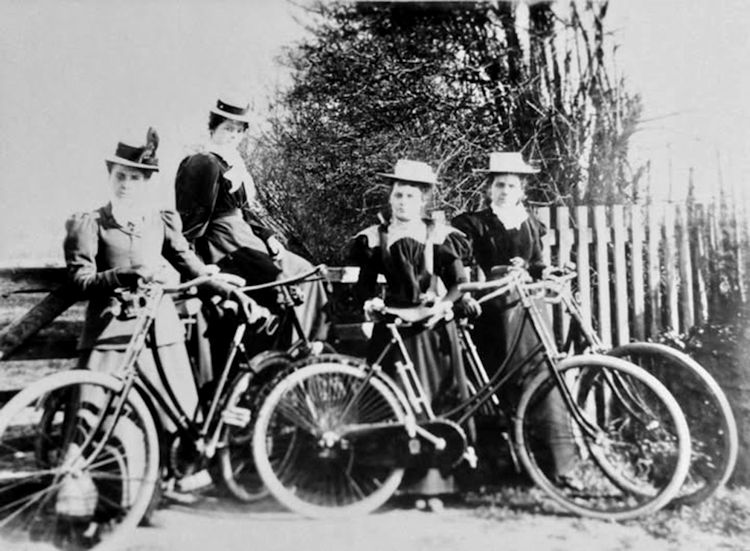
Above photo, circa 1894. The "Whitehall Inn" was a popular destination
for walkers and cyclists in the late Victorian and Edwardian period.
This image was apparently discovered by Canterbury's well-known
photographic historian, Paul Crampton, though who the ladies are isn't
yet known. Clearly related (possibly twins and two other sisters?) it
seems unlikely that these ladies would have ventured into the pub itself
but as the "Whitehall Inn" served lunches and teas in the garden,
perhaps that would have been all right, according to the social
conventions of the day. Given the weight of cameras in the 1890s and the
complexity of taking photographs, it's probable that these ladies either
arranged for the photographer to be at the "Whitehall Inn," or that they
were part of a larger group (cycle club?) whose members all had their
photos taken. Kindly sent by Rory Kehoe. |
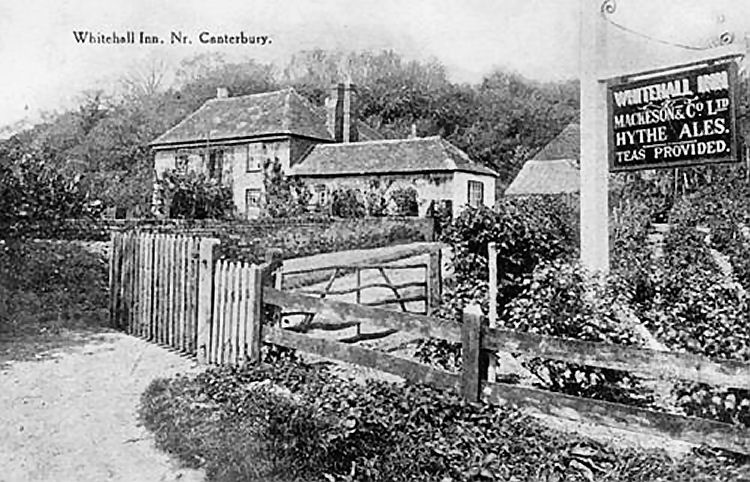
Above postcard showing the "Whitehall Inn" date 1908.
|
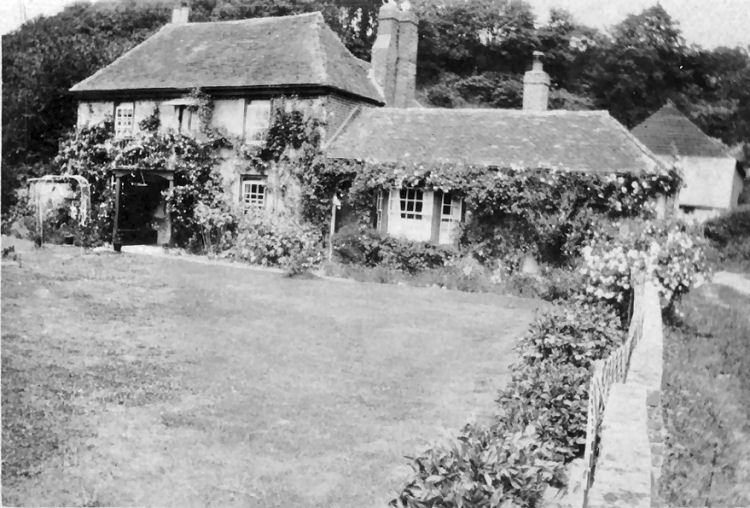
Above photo, date late 1920s/early 1930s when the "Whitehall Inn" was
a dairy farm and tea rooms. It was a popular venue for cyclists and
walkers. (Local information from Rory Kehoe MK.) |
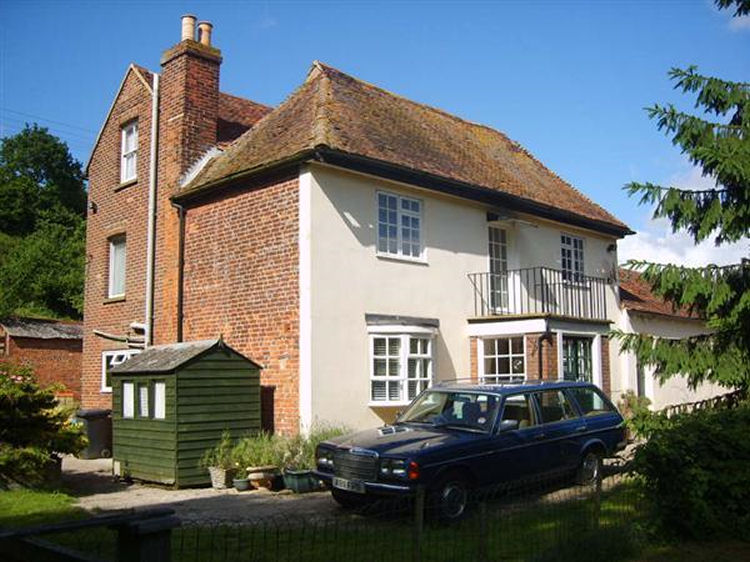
Above photo showing what is now referred to as Whitehall Farm. 2013. |
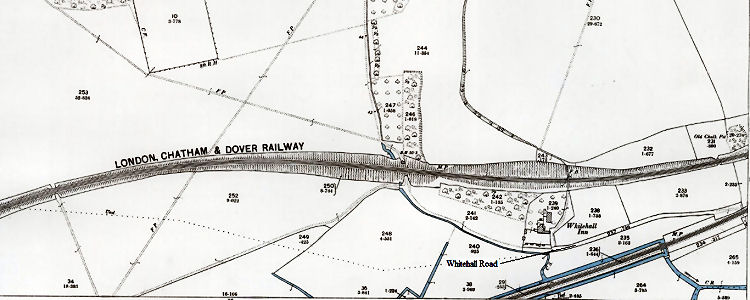
Above map 1896. |
The census of 1871 addressed this as in Rough Common.
This building has been identified as a pub from around 1700 but
unfortunately closed just before the first world war and was a private house
as listed in the 1911 census. The premises also housed its own brewery for
beer but ceased production about 1840, however, cider was still made till
about 1900. Mackeson's acquired the Whitehall Inn (unexpired lease) when
they bought de Trafford's Sun Brewery, Littlebourne, Kent in 1907.
In 1830 licensee Edward Pilcher was deemed an insolvent debtor.
Until November 1907 the "Whitehall Inn" was a tied house of De Trafford's
Brewery of Littlebourne. As far as I know, Humphrey E De Trafford bought an
established brewery, with 6 tied houses, in c.1897. The "Sun
Brewery," Littlebourne probably ran on a shoestring and couldn't compete
with the larger breweries. Mackeson's took on the unexpired lease of the pub
but it was closed just before WW1. The freehold was in the hands of the
Master of Eastbridge - The Hospital of St Thomas, Canterbury.
I am informed that the pub was actually owned or at least supplied by
Shepherd Neame from between 1864 and 1882.
The freehold of the Whitehall Inn and surrounding 9 acres was owned in
1846 by The Master of Eastbridge Hospital, who (until 1844) received a tithe
(10%) as an agricultural products tax in lieu of rent. From 1836 the archaic
system of tithes was replaced by rent, as per the Tithe Commutation Act. In
cases of dispute, the Tithe Rent Charge would be assessed by a Tithe
Commissioner and an agreement drawn up between Landlord and Tenant.
In 1844, a Tithe Award was negotiated between Eastbridge Hospital and
whoever was the tenant of the Whitehall Inn at that time. The tenant may
have been William Laurence(?) The 1841 Census lists William (aged 54)
Penelope (50) and Thomas (91) but the Enumerator's copperplate handwriting
makes decyphering the family surname difficult.
On Friday 6th February 1846 the South Eastern Railway was opened between
Ashford and Canterbury, with the line to Ramsgate opening a week later on
13th April. Canterbury became Canterbury West in 1st July 1889 to avoid
confusion with the London, Chatham and Dover Railway station (now Canterbury
East) which opened on 9th July 1860.
Possibly as a result of the Kentish Gazette advert, George Smedley took
on the tenancy of the Whitehall Inn, as he is listed as licensee in
Bagshaw's 1847 directory. However, Mr Smedley didn't last long at the
Whitehall Inn, as the 1851 Census lists Thomas and Eliza Howland (and their
10 children!) as the occupants.
|
From Perry's Bankrupt Gazette 20 February 1830.
INSOLVENTS APPLYING TO BE DISCHARGED.
PILCHER, Edward, of the "Whitehall" public-house, Harbledown, near
Canterbury, Kent, licensed victualler. |
|
Kent Herald, 6 February 1845.
Canterbury. To be Sold by Auction, by Mr. Henry Bird.
On Thursday, the 20th day of February, 1845, at 3 o'clock in the afternoon
precisely, at the "Falstaff Inn," in the City of Canterbury, by order of the
trustees and the late of the late Mr. John Collins, deceased, and subject to
such conditions as shall be then and there produced.
Lot 1. All that Messuage Tenement, or or public house, called "Whitehall," with
the buildings, Gardens, Pleasure Grounds, Bowling Green, and Appurtenances, and
Two pieces or parcels of Pasture Land thereto adjoining, containing 6 acres,
more or less, situate and being in the parish of St. Michael, Harbledown, in the
county of Kent, and now in the occupation of William Lawrence.
The above well-known property is held under a renewable Lease from the Master of
Eastbridge Hospital, Canterbury, for 21 years, from the 11th October, 1842,
yearly rents amounting to £3 8s., within one mile of the City of Canterbury, and
abuts on the South-Eastern Branch Railway now forming from Canterbury to
Ashford.
For further particulars apply to the office of Mr. Thomas Wilkinson, solicitor,
Canterbury.
|
|
From the Kentish Gazette, 3 February 1846.
TO BREWERS, PUBLICANS, AND OTHERS.
TO BE SOLD OR LET, with Immediate
Possession.
ALL that LEASEHOLD FULL PUBLIC HOUSE and TEA GARDENS, known as
“WHITEHALL,” with BOWLING GREEN, Excellent GARDEN, well stocked with
Fruit and Filbert Trees, a large BARN, and 9a. 2r. of PASTURE LAND, more
or less, situate about 10 minutes' walk from the City of Canterbury, and
adjoining the South Eastern Railway, of which it commands an extensive
view.
The above offers an opportunity for investment rarely to be met with.
For particulars and to treat for the same, apply to Mr. G. Cooper, St.
Peter’s-Street, Canterbury; or to Mr. G. Burch, Kent Herald Office,
Canterbury.
|
|
Kentish Gazette, 4 March 1851.
Canterbury and Harbledown.
Desirable Freehold and Leasehold Estates, and Life Assurance Policy, to
be sold by auction by Messrs. Cooper. On Thursday
the 6th day of March 1851, at three o'clock precisely at the "Falstaff
Inn," Canterbury.
By order of the Devieces in Trust under the Will of the late Mr. John
Collins, and subject to such conditions shall be then and
there produced.
Lot 11. All that Messuage, Tenement, or Public House, called
"Whitehall," with the buildings, gardens, pleasure ground,
bowling green, and 2 pieces or parcels of pasture land thereto
adjoining, containing 9 Acres more or less, situate and being in
the parish of St. Michael, Harbledown, in the county of Kent and now in
the occupation of Thomas Howland at the yearly rent of £30.
The above well-known property is held under a lease from the Master of
Kent Bridge Hospital, Canterbury for 21 years, from
11th October, 1842, at yearly rents amounting to £3 8s. Is situated
within one mile of the City of Canterbury, and abuts on the
South Eastern Branch Railway, from Canterbury to Ashford.
|
|
Southeastern Gazette, 25 January 1853.
At the county magistrates' office on Saturday, a person named Mills
was fined £3 and costs, for having fired a gun at a young man at a
pigeon match at the "Whitehall" public-house. The complainant was
not injured at the time, though the shot struck him at the side of
the head and stunned him. The charge was preferred as one of
assault. The magistrates severely reproved the defendant for having
fired his gun, which he stoutly denied; but the evidence in support
of the complaint was too strong for his denial to be relied on.
|
|
Kentish Gazette, 25 January 1853.
ST. AUGUSTINE'S PETTY SESSIONS.
Saturday, Jan. 22.
(Present: Edwd. Foss, Esq., (chairman) and a full bench of of
magistrates.)
James Mills, gun maker, of Westgate, appeared to a summons
charging him with having assaulted Solly Solomons, on the 13th
inst., by firing a gun at him. It appears that oh the day in
question there was a pigeon match at "Whitehall" public-house, and
that complainant and defendant were looking after the stray pigeons;
a pigeon fell into a dyke, and was got out by the complainant, who
was running off with it when the defendant called to him to stop or
he would shoot him; the former however continued his course, when
Mills fired at him, when about 9 rods from him; fortunately none of
the shots took effect, though the complainant was stunned and fell
to the ground. Confirmatory evidence of the charge was adduced; but
the defendant urged that he fired his gun, but not at the
complainant. The Bench severely censured the defendant for his
conduct, and at first doubted whether they would be justified in
disposing of the case summarily; but at length decided on fining him
£2 and costs.
The money was immediately paid, or he would have been committed
to prison for one month.
|
|
South Eastern Gazette, 26 June, 1860.
Insolvents.
Protection Cases:- The following passed their first examination:-
Wm. Sellen, landlord of the "Whitehall public-house" near
Canterbury. Debts £280 16s. 10d., assets £21 9s. 3d. Upon the
application of Mr. Eaden, some goods in the for insolvant's
possession, for which he had given his brother a bill of sale, but
not been put in force, were ordered to be taken possession of by the
messenger of the court.
The holder of the bill of sale has been inserted in the schedule.
|
|
South Eastern Gazette, 25 September, 1860.
The ordinary monthly sitting of this court was hald in the
Guildhall, on Wednesday last, before Charles Harwood, Esq., Judge.
Benson V. Sellen.
An action for the recovery of £4. Plaintiff is a bailiff and
broker of this court, and the defendant the landlord of the "White
Hall" public house, in the vicinity of this city. Mr. Eaden for the
plaintiff, Mr. Minter for the defendant.
From the statement of Mr. Eaden, it appeared that the defendant a
short time since petitioned the court under the insolvent act, and
when he came up for hearing his honour made and order for the
bailiff to take possession of certain goods in the insolvents
possession, upon which his brother held a bill of sale. The
plaintiff accordingly took possession of the goods and valued them.
His percentage upon the goods came to £4, and was the sum now sued
for. Some arrangement was afterwards made, satisfactory to the
creditors, and the defendant withdrew his petition, the officer also
withdrawing from procession of the goods.
Mr. Minter objected to the payment of the claim, because, he
said, the officer of the court had advised his client not to remove
the goods, he had evidently given this advice for the purpose of
receiving the fees now claimed. If the goods had been removed as
advised by him (Mr. Minter) there would have been no necessity for
the valuation.
The plaintiff proved the facts as represented by Mr. Eaden, and
Mr. Minter called the defendant, his brother, and Mr. T. B. Green,
to substantiate the versions of the case which he had given.
His Honour said this matter had arisen entirely from the officers
not applying for better instructions before giving up possession of
the goods. If they had applied to him, he would have extended the
conditions upon which they were to have possession. He was of
opinion, however, that under the circumstances the action did not
lie between the broker and the insolvent. At the same time, he did
not believe that the insolvent acted entirely upon the advice given
by the officer.
Verdict for the defendants, without costs.
|
|
From the Kentish Gazette, 10 January 1865.
Transfer of Licenses.
This was a special petty session for the transfer of public-house
licenses.
The license of the "Whitehall," Harbledown, from
Robert Chase to John Jull.
|
|
From the Kentish Gazette, 2 May 1865.
WHITEHALL INN
THE Inhabitants of Canterbury and its vicinity arc most
respectfully informed that the premises attached to this favourite
resort for visitors have been put in first class order. The splendid
green is open daily for bowles, trap, &c., and every precaution will
be taken to insure the convenience and, promote the comfort of those
who may favour the proprietor with their patronage. Shepherd, Neame
and Co's. Fine Ales and London Porter, Spirits of the choicest
quality.
JOHN JULL, Proprietor.
Whitehall, April, 1865.
|
|
From the Canterbury Journal, 6 May, 1865.
WHITEHALL INN.
TO THE INHABITANTS OF CANTERBURY AND ITS VICINITY.
Having taken the above premises, I beg to inform you that arrangements
have been (and will be) made to secure the comfort of those who may
kindly patronise this is establishment. The Bowling Green now in good
condition is available for bowls during the week, except Tuesday, on
which occasion the Trap Club is held. Shepherd, Neame, and Co's Sparkling Ales.
London Porter.
Spirits of the Choices Description. Your humble servant, John Jull. Whitehall, April, 1865. |
|
Whitstable Times and Herne Bay Herald, 25 June 1870.
MELANCHOLY FATAL ACCIDENT.
On Monday evening, an inquest was held before Mr. T. T. Delasaux
(Coroner), at the "Whitehall Inn," on the body of a labouring man named
William Hawkins, aged 53, who had been living in the parish of Chartham,
and who on Saturday night met with an awfully sudden death whilst
crossing the South-Eastern Railway at Whitehall.
The jury having been sworn, and Mr. Edward Pillow elected foreman
thereof, the body was viewed and Mary Horton, a woman living at
Chartham, was called to identify the deceased.
Frederic Miller was next sworn. He said:- I live at Ramsgate, and am an
engine driver employed by the South-Eastern Railway Company. I was the
driver of the engine of the down train on Saturday night, which left
Ashford at 9.12. On arriving at the level crossing at Whitehall, I
observed something fly out in front of the engine, my attention being
called thereto by the ballast flying up. When we stopped at Canterbury,
the next station, I examined the engine, and on the left hand buffer I
found some butter and sugar. This discovery I reported to Mr. Fright,
the Station-master, and proceeded to Ramsgate.
The Coroner:- Was the train punctual or was it late?
Witness:- It was a few minutes behind. It was 9.40 when we arrived at
Canterbury, and when we were at Whitehall it would, therefore, be about
9.38, or some seconds later.
Being further questioned, the witness said:-
I received no warning whatever that there was any obstruction on the
line. The first circumstance which arrested my attention was the ballast
flying up. It was dark at the time. Everything was in proper order on
the line. The buffer lamp of the engine was alight, and anyone facing
the engine must have seen it. As far as know, nothing could have been
done to prevent the accident. I do not think any blame can be attached
to any of the railway officials or anyone. We were travelling at a
proper pace, and my opinion is that the occurrence was purely an
accident. I saw no object before the train, nothing transpired to induce
me to stop the engine.
Mary White, a married woman, said she lived at Chartham. She was
proceeding homewards from Canterbury on Saturday night, and it was five
minutes past nine when she was going through Water-lane towards
Whitehall. She saw the deceased leaning against a wall, and perceived
something strange in the expression of his countenance. She went on, and
afterwards noticed that he was behind her, with a basket containing
provisions. When she saw him again he was a corpse, and had then been
removed to the Whitehall house. She had known the deceased, and had of
late noticed something rather strange in his manner, but she never heard
him make use of any threat. He had appeared "queer" ever since he left
Mr. Pell’s service.
The Coroner:- For my own part, I think there is nothing to lead us to
believe the unfortunate man contemplated suicide.
The Foreman:- Certainly not.
Leonard Philpott deposed that he was a ticket collector employed at the
Canterbury station of the South-Eastern Railway. In consequence of
information which was reported to the Station-master on Saturday night,
he, with the night watchman, was dispatched up the line, and on arriving
at Whitehall, about 22 yards from the crossing, they found the body of
the deceased lying on the left hand side of the down line, about 3 or 4
feet there from. Before taking any further steps, they awaited the
arrival of Mr. Fright, and after the arrival of the surgeon and
Superintendent of Police, the body was removed to the adjoining inn. A
hat was picked up between the crossing and the spot where the body was
found.
John Croucher, night watchman at the Canterbury Station, corroborated
this evidence, and added that on Mr. Fright’s arrival he (witness) was
sent by him for the nearest surgeon, and Mr. Holttum shortly afterwards
came.
Mr. Charles Holttum, surgeon, of Canterbury, said:- I was sent for about
half-past ten on Saturday night to go to the Whitehall crossing, and I
proceeded thence immediately. On reaching the spot pointed out to me, I
found the body of the deceased lying on the left hand side of the down
line. He was quite dead, and on examining him externally I found he had
sustained the following injuries which might have been produced by an
engine knocking him down. Judging from his position his neck was
apparently broken, his head being doubled back between his shoulders.
The left side of his head was completely smashed and I should say every
bone therein was broken. The buffer must have a track him on the left
hip, of which there was a compound fracture, as also of the pelvis, the
left thigh, and the left leg, both arms being broken. There was no doubt
these were the cause of death, which must have been instantaneous.
This being the whole of the evidence.
The Coroner briefly addressed the jury, remarking that the most
important feature in a case of this description was whether there had
been any carelessness or neglect. Taking the evidence as adduced before
them, they would at once arrive at the conclusion that no one was to be
blamed. Then, again, although a female witness had stated that the
manner of the deceased had of late been strange, he did not think any
one present would believe the deceased committed suicide.
The jury shortly afterwards returned a unanimous verdict that the
deceased met with his death accidentally by being knocked down by an
engine whilst going over the crossing at Whitehall.
In reply to enquiries addressed by the foreman, the Coroner stated that
the Railway Company had, he was informed, appointed a man to open this
gates across the road for carriages to go over the line, but it appeared
that as there was no public footway the Company were not bound to look
after pedestrians; if they were, they would have to provide gates across
the line instead of across the road.
Mr. Fright informed the jury that the man at the gates always had notice
by means of signal bells of the approach of any train as it left either
or Canterbury.
The proceedings then terminated.
|
|
From the Whitstable Times, 30 June, 1900.
The East Kent Coroner (R. M. Mercer, Esq.) held an inquest on Monday at
the "Whitehall Inn," Harbledown, on the body of John Cornish, who
committed suicide by placing himself on the railway.
Elizabeth Cornish, of 68, St. Peter’s Lane, Canterbury, deposed that
deceased was between 32 and 33 years of age. He was a coal carter and
formerly worked for Pilch, Collard, and Co. After he left their employ
he went to Mr. Burnistone but had a quarrel with him and got the sack.
He left home that morning at 5.30. He told witness he was going to
Faversham by the five minutes to six train and that he had got work and
would send a van down on the following day for her furniture. He had
never threatened to take his life. He had complained to witness about
his mates taunting him.
James Whittaker, a platelayer in the employ of the L.C. Railway, stated
that that morning at 7.30 he was on the line when he saw a body lying on
the rails. He went to it and found it was deceased. He had the top of
his head cut off. The last train up was at 7.18.
The jury returned a verdict of "Suicide whilst temporarily insane."
|
|
From the Whitstable Times, 14 July, 1900.
HARBLEDOWN. A PROPER CASE FOR INVESTIGATION.
George Smith, landlord of "Whitehall Inn," Harbledown, was summoned for
permitting drunkenness on his licensed premises on the 24th June.
Mr. R. M. Mercer, appeared for defendant, who pleaded not guilty.
P.C. Vennell stated that on Sunday evening, the 24th June, he was
ordered by the Superintendent to visit defendant’s house in plain
clothes. He arrived at the inn at a quarter to eight and entered the
front of the bar where he was served with a glass of ale by the
landlord. Witness remained there about a quarter of an hour and during
the whole of the time there were about ten lads out on the pleasure lawn
and in the summer houses. Their ages varied from 14 to 18. Two of them
were drunk and the remainder were more or less under the influence of
drink. One of them gave the name of Williams. When he went from the
garden out of the gate he rolled about outside. He then met a lad who
gave the name of Johnson and they commenced to quarrel, pulled off their
jackets, and began to fight. He stopped them and took their names and
addresses. One of them gave the name of Arthur Johnson, 81 Longport, and
the other James Williams, 77 Military Road, Canterbury. In consequence
of the drunken condition of Williams he took him to the police station
and locked him up. On the following day he was taken before the
Magistrates and fined 5s. and costs. During the time witness was in the
house all the lads were constantly drinking from pots. Defendant was
serving in the bar the whole time. After he had locked Williams up he
visited the house with Superintendent Jacobs, who told defendant he
should report him. Defendant replied that he was not aware that any
drink or anything wrong had been going on.
Cross’ examined:- It was raining at the time.
Mr. Mercer submitted that so far from his client being to blame he was a
very badly used creature. These boys were a curse to him on Sundays and
they broke his hedges and seats. Defendant deposed the evening in
question there were a lot of people standing round the bar as it was
wet, and he did not see any boys come in for drink. He did not hear any
disturbance in the garden.
Mrs. Rosa Smith, of 66 St. Peter's Place, Canterbury, deposed that on
the evening of the 24th June she and her husband took shelter from the
rain in one of the arbours at the "Whitehall Inn." She saw seven lads go
in the adjoining arbour. They had one jug of beer which one of the lads
fetched from the public house. She saw the lads leave the ground. There
was no disturbance.
Mrs. Rachael Bowen, of 55 Black Griffin Lane, who was also in one of the
arbours, stated that she saw one of the boys go into the house and come
back with a jug. She heard no shooting or singing, but saw a gentleman
outside the door speak to the boys. He pulled out a book and wrote in
it.
The Chairman said the Bench considered it a proper case for the police
to bring before then, but there was not sufficient evidence to warrant a
conviction and the case would be dismissed. They hoped defendant would
be careful in future as to how he conducted his house.
|
LICENSEE LIST
PILCHER Edward to Feb/1830
LAWRENCE William 1841+ (age 55 in 1841 ) )
SMEDLEY George 1847

HOWLAND Thomas 1851-55+
(age 47 in 1851 ) ) 
SELLEN William 1860-61+

CHASE Robert 1862-Jan/65

JULL John Jan/1865+
GODDEN Francis 1871+ (age 63 in 1871 ) )
WINTON Alfred S 1881+

HOGBEN William 1882-91+ (age 45 in 1891 ) )
 
BALDOCK Albert E 1901+

SMITH George 1900+
SMITH Charles 1903+
 
https://pubwiki.co.uk/WhiteHallTavern.shtml
 Census Census
 From Bagshaw Directory 1847 From Bagshaw Directory 1847
 From the Post Office Directory 1855 From the Post Office Directory 1855
 From the Post Office Directory 1862 From the Post Office Directory 1862
 From the Post Office Directory 1882 From the Post Office Directory 1882
 From the Post Office Directory 1891 From the Post Office Directory 1891
 From the Post Office Directory 1903 From the Post Office Directory 1903
 From the Kelly's Directory 1903 From the Kelly's Directory 1903
|




